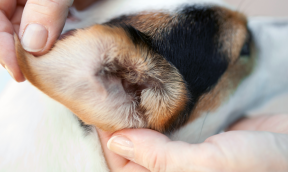
How can we help stressed dogs have a more serene existence day to day?
Contents: What are the symptoms of stress in dogs? | What are the most stressful situations for dogs? | How can we make stressed dogs calmer, to offer long-term relief? | How can we help dogs be more relaxed from a young age?
Animals and humans are affected by stress in the same way. When faced with a dangerous event or irrational fear, recognising the signs of stress in dogs helps improve their wellbeing and keep them healthy. How do stressed dogs behave? What types of situations do pets find stressful? Francodex offers a range of advice and solutions to combat stress to help pets feel more serene.

What are the symptoms of stress in dogs?
Stressed dogs are easy to recognise as their behaviour changes significantly.
⚠️Note: stress reactions vary from one dog to another, according to their temperament and life experiences.
Rapidly noticing signs of stress in your dog will allow you to take prompt action to soothe your pet and restore a sense of wellbeing in most situations.
The most common symptoms of stress observed in dogs are as follows:
- running away, hiding in dark corners;
- excessive panting without physical exertion;
- violently trembling and highly agitated behaviour, or even shivering;
- hypersalivation and compulsive licking;
- barking for long periods;
- accelerated heart rate;
- dilated pupils and fur standing on end with fight or flight behaviour;
- destructive behaviour;
- slackening of the urinary sphincter, with more or less frequent urination, varying in volume;
- lack of attention;
- sweaty paw pads;
- in the event of intense stress, onset of gastrointestinal symptoms, such as diarrhoea, vomiting, loss of appetite or disturbed sleep.
These different types of behaviours typical of canine stress may be observed at the same time or separately.
🐶 What is the difference between stress and anxiety in dogs? Although the symptoms of anxiety and stress can be very similar, anxiety in dogs is a disorder which requires veterinary guidance. Stress and anxiety do not, in fact, have the same causes and symptoms. Stress constitutes a normal physiological response to a sudden change or an unusual external factor, for example, thunderstorm, fireworks, visit to the veterinary clinic, etc. However, anxiety is an emotional state of fear or tension, which becomes pathological when it persists or becomes constant. Symptoms of anxiety become excessive and uncontrollable. Furthermore, these symptoms persist even without specific external factors. Medication may be envisaged in addition to behavioural therapy.
What are the most stressful situations for dogs?
All kinds of situations can prove stressful for pets once they step outside of their daily routine.
Not all dogs react in the same way. The more often pets have contact with different people and other animals, and have to deal with different situations, the more relaxed they will be when having to face different types of events.
In contrast, dogs with set routines can become stressed for no reason at all, such as a shrill noise or a change in the daily routine.
Dogs generally find the following situations stressful:
- veterinary or grooming appointments;
- moving house;
- arrival of a new baby or a new pet;
- meeting unfamiliar humans or animals;
- unusual noises the source of which is difficult to identify.
- The following events can also be a source of stress for pets, depending on their daily routine:
- car journeys, if your pet is not used to travelling;
- going away on holiday, if your dog has never been in a different living environment;
- loud or aggressive noises, if your pet is always in a quiet environment

🎆 Fireworks and thunderstorms : fireworks are stressful events as dogs have more sensitive hearing than humans. They can hear frequencies of up to 50,000 Hz whereas humans can only hear frequencies of up to 20,000 Hz. Likewise, thunderstorms are an intense experience due to the variation in atmospheric pressure and lightning. The noise also obviously comes into play.
Dogs should be rapidly socialised and accustomed to being left alone for a few hours a day. Otherwise, they can develop separation anxiety, a source of behavioural disorders.
Lastly, pets may be stressed, nervous or even anxious due to their past. Mistreated or abandoned animals will be deeply affected by these traumatic events. Adopt a positive and compassionate approach to help restore your pet’s wellbeing and keep him healthy.
How can we make stressed dogs calmer, to offer long-term relief?
Your pet is trembling and panting during a thunderstorm and you feel powerless. Likewise, you want your dog to have fun with other dogs when you go to the park, but while other dogs are playing, chasing and nipping each other, your dog is lying down at your feet.
It is essential to recognise signs of stress in dogs promptly to avoid them feeling worse. Do not force your pet to go somewhere or do something if he is afraid. You should keep your dog away from stressful situation insofar as possible.
However, this is not always possible. If your neighbours are having building work done, if you have just had a baby or if you are going away on holiday tomorrow, your dog will need to patiently grin and bear it and put up with a situation that is stressful, but not dangerous.
How you act when your dog faces an unexpected and potentially stressful event will also have a decisive effect. If you act as though everything is completely normal, your dog will then more readily understand that there is nothing to fear.
However, if you reassure your dog and fuss over him more than usual, he might think his fear is justified and it will become a repeated behaviour. This will reinforce the problem and will not help your pet to adjust and overcome his worries.
To help dogs deal with stress, Francodex offers a number of anti-stress products available in different formats, depending on your preferences.

Anti-stress collar for dogs
Anti-stress collars continuously diffuse their active ingredients over a prolonged period of 4 months.
These contain valerian extracts, with models available for small dogs and puppies, dogs weighing 10 to 20 kg and large dogs.
Anti-stress pipettes for dogs
Anti-stress pipettes with valerian extracts have an anti-stress action effective for 2 weeks.
These are easily and rapidly applied between the shoulder blades.
Environment anti-stress spray
Environment anti-stress spray is sprayed around your dog’s favourite places in your home or in your car when travelling.
It contains extracts of relaxing plants, such as valerian, passionflower, hawthorn and catnip.
Anti-stress treats for nervous dogs
Anti-stress treats contain L-tryptophan, an amino acid essential to nervous system regulation in dogs. Chamomile and lemon balm extracts are known for their soothing properties.
This ideal solution is a delectable treat which aids relaxation, particularly when training puppies using positive reinforcement methods.
Soothing oral solution for dogs
The oral solution presented as anti-stress drops containing L-tryptophan has a long-term soothing effect, with no side effects or dependence, as it is a complementary food, not an anti-depressant or psychoactive medicinal product.
Add drops to your pet’s food or dispense directly into your pet’s mouth. Start dosing 3 days before a stressful event or over a period of 2 months for pets having to deal with long-term changes.
The oral solution is a good choice for dogs requiring a regular calming product.
Anti-stress tablets for nervous dogs
Tablets for nervous dogs with L-tryptophan offer a complete formula for long-term administration, up to two months for dogs displaying difficult behaviour aged over 6 weeks (to be initiated 3 days before the start of the stressful event).
The anti-stress tablets contain a combination of nutritional active ingredients, such as magnesium, selenium, vitamins B3 and B6, etc. These work in synergy to calm body and mind in dogs when facing stress and day-to-day tensions.
If in doubt, or if there is no progress in the stressed animal’s behaviour, contact your veterinary surgeon or a canine behaviour expert.
Francodex products are also a perfect addition to medicinal treatment to make your pet more comfortable.
🐶How to calm stressed dogs ? Stressed dogs will generally feel reassured in a stable environment. Avoid frequent and sudden changes, and keep an eye on your pet’s routine and rest time. If you have children, teach them to respect their pet from an early age by adopting gentle gestures and playing a good distance from their pet.
How can we help dogs be more relaxed from a young age?
If you have already lived with several pets, you will be aware that they are all different.
Like humans, they have their own character, preferences and also their sources of stress. Although no dog breed is any more susceptible to stress than others, each individual animal has its own sensibilities.
Strategies to reduce stress in dogs vary according to the character and specific needs of each animal.
Veterinary surgeons specialising in canine behaviour offer valuable guidance when drawing up a plan suited to each situation. However, you can help your pet learn more relaxed behaviours through:
- play and physical exercise. Dogs that are mentally and physically stimulated will keep their minds busy and feel better in themselves;
- early, positive socialisation, encouraging contact with other dogs and humans from a very young age to socialise your pet. Social contact can help prevent stress and anxiety behaviours in pets;
- positive reinforcement, rather than severe punishment, to boost your pet’s self-confidence.
If your dog suffers from specific phobias diagnosed by an animal behaviour professional, desensitisation and counter-conditioning techniques will be beneficial.
Stressed dogs will thus be asked to gradually tolerate stimuli which trigger stress and fear. Take care of your pet and remember that he senses all your emotions. Stay calm!
Article drawn up with the assistance of
Dr Stéphanie PADIOLLEAU, Veterinary Surgeon




